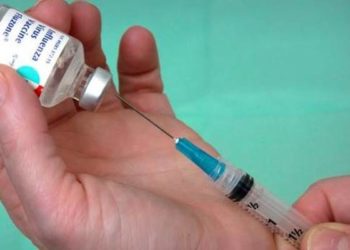Shared decision-making associated with increased parental resistance to vaccinations
Image: PD
1. Providers’ use of a participatory format when initiating vaccine conversations with parents, rather than a presumptive format, was associated with increased parental resistance to vaccinations.
2. Half of parents (47%) who expressed initial resistance accepted the provider’s vaccine recommendation after providers pursued it.
Evidence Rating Level: 3 (Average)
Study Rundown: The estimated current vaccination rate is below 80%, with a high proportion of parents having concerns about childhood vaccines and rates of nonmedical vaccine exemptions increasing annually. It is therefore critical to improve childhood vaccine coverage, an aspect of which is improving provider-parent communication. Because providers play key role in parental vaccine decision making, this study sought to determine which communication practices were associated with parents’ resistance to vaccination. Results indicate that use of a participatory initiation format for vaccine conversations (e.g., “What do you want to do about shots?”) were associated with increased parental resistance, as compared to a presumptive initiation format (e.g., “So, we’ll do 3 shots today. Is that okay?”). Furthermore, how providers responded to initial resistance influenced parents’ ultimate decision: 47% of parents who expressed initial resistance accepted the provider’s vaccine recommendation when providers pursued it (e.g., “He really needs these shots”). Limitations included the inclusion of only a single vaccine encounter; discussion may have varied over several encounters and with time. The study demonstrates the significance of initiation as a communication practice in vaccine discussions. Specifically, shared decision may not be indicated in vaccine discussions when there is only one medically acceptable choice.
Click to read the study, published today in Pediatrics
Relevant Reading: Vaccine Attitudes, Concerns, and Information Sources Reported by Parents of Young Children: Results From The 2009 HealthStyles Survey
Study Author, Dr. Doug Opel, MD, MPH, talks to 2 Minute Medicine: Assistant Professor, Division of Bioethics and Division of General Pediatrics, Department of Pediatrics; Adjunct Assistant Professor, Department of Bioethics and Humanities, University of Washington School of Medicine.
“One of the important—perhaps the most important—influences on parental decision-making regarding childhood vaccines is their child’s doctor. There is evidence, though, that the vaccine conversation between doctors and parents doesn’t always go so well, and this may be one reason why more parents are refusing vaccines. So we looked at how this conversation went during actual well-child visits; before we can figure out how to try and make the doctor-parent vaccine conversation better, we need to know how it currently goes. What we found was surprising: doctors who began the vaccine discussion using a question such as “What do you want to do about shots?” or “How do you feel about vaccines today?”—what we called a participatory format—was associated with more parent resistance to the vaccine recommendation than if the doctor simply told the parent what vaccines their child would be getting.”
In-Depth [cross-sectional study]: 16 pediatric providers from nine primary care practices were enrolled in this study, with 111 health supervision visits videotaped and analyzed. Of these visits, 50% included vaccine-hesitant parents (VHPs) and the majority of parents were married, white mothers, ≥30 years old, with a household income of >$75,000. 62% of providers did not solicit questions about vaccines, but discussed the rationale (55%) and potential side effects (55%). Most providers (74%) used a presumptive rather than a participatory format to initiate vaccine recommendation. However, significantly more providers used a participatory format with VHPs than with non-VHPs (41% vs 11%, p=.001). A greater proportion of all parents resisted vaccine recommendations when providers used a participatory format, rather than a presumptive one (83% vs 26%, p<.001). Regression analysis indicated that provider use of participatory formats was associated with a significantly increased odds of parental resistance (OR = 14.2). Furthermore, 47% of parents (27% of VHPs and 75% of non-VHPs) accepted the provider’s recommendation immediately after the provider pursued it.
More from this author: AAP policy statement addresses influence of media on children; Pediatric gunshot injuries associated with higher mortality and costs; Psychotropic medication use declining in children with behavioral disorders; Postnatal breastfeeding concerns associated with discontinuation; Childhood bullying associated with increased risk of psychosomatic problems
© 2013 2minutemedicine.com. All rights reserved. No works may be reproduced without expressed written consent from 2minutemedicine.com. Disclaimer: We present factual information directly from peer reviewed medical journals. No post should be construed as medical advice and is not intended as such by the authors, editors, staff or by 2minutemedicine.com. PLEASE SEE A HEALTHCARE PROVIDER IN YOUR AREA IF YOU SEEK MEDICAL ADVICE OF ANY SORT.





